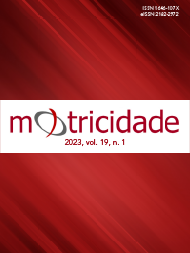Does the satisfaction of psychological needs predict the development of life skills in dual-career athletes?
DOI:
https://doi.org/10.6063/motricidade.27358Palavras-chave:
Psychosocial Skills, Self-Determination Theory, Dual-careerResumo
The objective of this cross-sectional study was to investigate whether total need satisfaction and three separate basic psychological needs (autonomy, competence and relatedness) predict life skills development in dual-career athletes according to sex, type of sport, type of higher education institution and financial support. Participants included 136 Brazilian university athletes (65 boys and 71 girls) aged 17–23. Data collection was conducted via Basic Needs Satisfaction in Sport Scale (BNSSS) and the Life Skills Scale for Sport (LSSS). Bayesian multilevel linear regression model found that total need satisfaction and three separate basic psychological needs (autonomy, competence and relatedness) influenced life skills (teamwork, social skills, leadership, goal setting and communication) and total life skills development in dual-career athletes. Total need satisfaction influenced leadership and total life skills. Competence and relatedness influenced goal seating, social skill, leadership and total life skills. Autonomy might not have a strong correlation with life skills development dimensions standardised scores and total life skills standardised score independent of sex, type of sport, type of higher education institution and financial support. Based on such findings, satisfaction of all three basic needs combined (total need satisfaction) and separate autonomy, competence and relatedness was positively associated with the development of life skills in dual-career athletes.
Downloads
Publicado
Edição
Secção
Licença
Os autores dos manuscritos submetidos para publicação deverão ceder, a título integral e permanente, os direitos de autor (copyright) à revista Motricidade e às Edições Sílabas Didáticas. A cedência de direitos de autor permite a publicação e divulgação do artigo em formato impresso ou eletrónico e entrará em vigor a partir da data de aceitação do manuscrito. Os autores concedem, ainda, os direitos para a revista Motricidade utilizar e explorar o respetivo artigo, nomeadamente para licenciar, ceder ou vender o seu conteúdo a bases de resumos/indexação ou outras entidades.
Nos termos da licença “Creative Commons”, os autores poderão reproduzir um número razoável de exemplares para uso pessoal ou profissional, mas sem fins comerciais. Nos termos da licença SHERPA/RoMEO, os autores poderão, ainda, disponibilizar/arquivar uma cópia digital final (versão postprint) do artigo no seu website ou no repositório científico da sua instituição.


